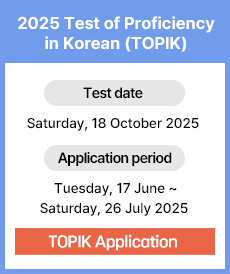English teachers in Korea programs (TaLK / EPIK)
'The Teach and Learn in Korea (TaLK)' program and 'English Program in Korea (EPIK)' invites global talents from countries where the official language is English including Australia to teach English in Korean schools. Both programs are sponsored by the Government of Korea.
TaLK : Teach and Learn in Korea
 Eligibility
Eligibility
- TaLK teachers must be a national (citizen) of a country* where English is the primary language. Applicants must have completed 2 or more years of study or graduated from a 4-year university, or either have attained a 2-year Associate's degree
* Australia, United Stated, United Kingdom, Canada, New Zealand, Ireland, South Africa - Overseas Koreans who possess a permanent resident visa or are enrolled as university juniors/sophomores can also apply
- A Korean national without permanent residency can also apply, on the condition that they have completed primary and secondary education at one of the 7 English-speaking countries and have resided in that country for a total of 8 years or longer
- TaLK teachers must be a national (citizen) of a country* where English is the primary language. Applicants must have completed 2 or more years of study or graduated from a 4-year university, or either have attained a 2-year Associate's degree
-
 Contract period
Contract period - 6 months: extension can be discussed depending on local needs
-
 Working conditions
Working conditions
- Teaching location and school level: primary school in a rural area
- Working hours : 8 hours/day for 5 days/week plus 15 hours/week of after school class
- Scholarship : 1.5 million Korean won per month
- Other benefits: individual accommodation, Minister of Education's scholarship certificate, orientation (approximately 3 weeks), Korean culture experience, online training, holiday break (7 days), entry/departure allowance, settlement allowance, etc.
☞ For more information please visit the TaLK website.
English Program in Korea (EPIK)
 Eligibility
Eligibility
- • EPIK teachers must be citizens or permanent residents of a country* where the primary language is English. Applicants must have graduated from an undergraduate program or higher and must possess a Bachelor's degree or higher.
* Australia, United Stated, United Kingdom, Canada, New Zealand, Ireland, South Africa
- • EPIK teachers must be citizens or permanent residents of a country* where the primary language is English. Applicants must have graduated from an undergraduate program or higher and must possess a Bachelor's degree or higher.
-
 Contract period
Contract period
- 1 year, extension can be discussed depending on local needs
 Working conditions
Working conditions
- Teaching location and school level : primary and secondary schools in metropolitan and regional cities
- Working hours : 8 hours/day for 5 days/week, 22 hours of regular class teaching per week
- Wage: Approximately 1.8 million KRW-2.7 million KRW per month. Scholarship amount depends on the applicant's qualifications and teaching location
- Other benefits : individual accommodation, orientation (approximately 5-9 days), online training, paid leave (18 days), settlement allowance, contract renewal award, retirement benefits, etc.
☞ For more information please visit the EPIK website.
TaLK and EPIK in comparison
| division | TaLK (Teach and Learn in Korea) | EPIK (English Program in Korea) |
|---|---|---|
| Type of employment | Scholarship student | Teaching assistant |
| Work period | 6 months | 1 year |
| Placement | Rural areas | City and local regions |
| School level | Primary school | Primary and secondary school |
| Teaching type | After-school English classes | Regular English classes as part of the curriculum |
| Teaching hours | 15 hours/week | 22 hours/week |
| Award | Scholarship of 1.5 million KRW per month | Wage of 1.8 million KRW~2.7 million KRW per month |
| Other benefits | Accommodation, Minister of Education's scholarship certificate, various training programs, entry/departure allowance, settlement allowance, etc | Accommodation, various training programs, settlement allowance, contract renewal award, retirement benefits, etc. |
| Eligibility |
|
|





